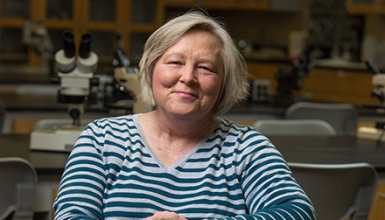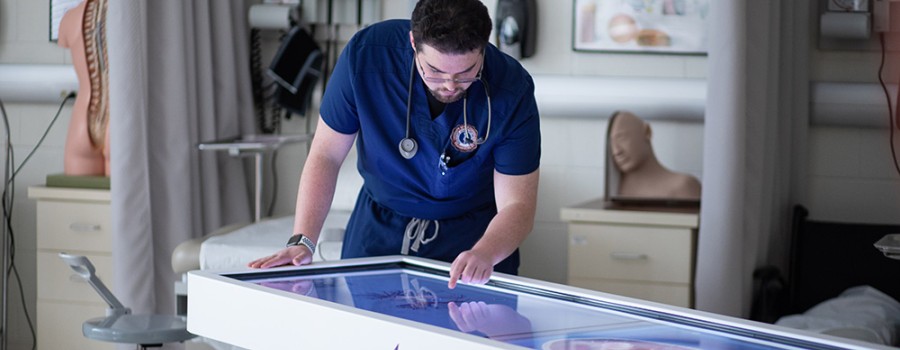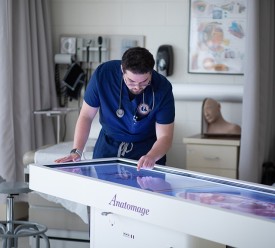Explore the complexities of the human body so you can help people heal.
Our pre-med students develop knowledge and skill in the natural sciences, social studies, and humanities – areas that medical school programs consider essential. Your coursework will prepare you to take on the challenges of the medical world. Medicine is an understandably difficult field to grasp. That’s where University of the Cumberlands’ pre-med program can make all the difference in your future.
By the Numbers
$208,000
3%
12+
16:1
Programs & Requirements
* The credit hours listed on this page only reference the specific program requirements and is not reflective of the total hours necessary to receive your degree. Cumberlands requires all students obtain a minimum of 60 hours for an associate’s degree and a total of 120 hours for a bachelor’s degree. Transfer and prior learning credits may be counted toward those totals.
To learn more about our General Education Requirements, please visit the page referenced below or explore our Academic Catalog.
Whether you're interested in diagnosing and treating patients, conducting research as a scientist, supervising other scientists and projects, or performing lifesaving surgeries, earning a pre-med degree at UC will help ensure your future success in a variety of scientific fields, paving the way to a successful and rewarding career. By completing a Bachelor of Science in Biology with a Pre-Professional Health Emphasis, you'll have a strong foundation in biology and a broad understanding of other key subjects that medical schools look for.
The courses you’ll take while studying in our pre-med degree program will give you robust preparation in varied sciences, particularly those relevant to the human body and its functions. You’ll be equipped with the medical knowledge and skills needed to enter into – and excel at – medical school. Whether you choose a chemistry or biology degree track for your pre-medicine program at Cumberlands, we've got you covered with advisors who can help guide you academically in both disciplines. It's all the support you need in a rigorous program, all focused on our main goal: your success.
Course Requirements
Students interested in applying to medical, dental, or veterinary school are strongly encouraged to complete these courses. It is important to review the admissions requirements requirements for each program to which you will apply because the prerequisites for admission may be slightly different among professional schools.
- BIOL 331 - Vertebrate Embryology
- BIOL 342 - Parasitology
- BIOL 345 - Microbiology
- BIOL 346 - Biochemistry
- BIOL 436 - Medical Biochemistry
- BIOL 441 - Immunology
- BIOL 442 - Comparative Anatomy
- BIOL 443 - General Physiology
- BIOL 445 - Molecular Biology
- BIOL 446 - Advanced Cell Biology
- BIOL 447 - Histology
This option is recommended for students entering a “blended” area such as pre-professional medically related areas (medicine, dentistry, pharmacy, physician assistant, physical therapist, etc.), chemistry/business, and chemistry/biology.
MATH 140, MATH 240, PHYS 241, and PHYS 242 are prerequisites for some upper-level chemistry courses.
- CHEM 132 - General College Chemistry I
- CHEM 111 - General Chemistry Laboratory I
- CHEM 232 - General College Chemistry II
- CHEM 211 - General Chemistry Laboratory II
- CHEM 331 - Organic Chemistry I
- CHEM 321 - Organic Chemistry Laboratory I
- CHEM 332 - Organic Chemistry II
- CHEM 322 - Organic Chemistry Laboratory II
- CHEM 336 - Analytical Chemistry
- CHEM 328 - Analytical Chemistry Laboratory
- CHEM 441 - Physical Chemistry I with Laboratory
- CHEM 434 - Inorganic Chemistry
- CHEM 490 - Senior Research Project
- CHEM 491 - Selected Topics in Chemistry
A Bachelor of Arts degree requires completing the same courses as a Bachelor of Science with the addition of completing one foreign language sequence through the intermediate level.
- FREN 131 Elementary French I
- FREN 132 Elementary French II
- FREN 231 Intermediate French I
- FREN 232 Intermediate French II
- SPAN 131 Elementary Spanish I
- SPAN 132 Elementary Spanish II
- SPAN 231 Intermediate Spanish I
- SPAN 232 Intermediate Spanish II
Take the Next Step
Mission and Goals
The mission of the pre-medicine program at University of the Cumberlands is to provide the knowledge and skills that will prepare you for medical school and help you succeed in various fields of service in healthcare and related sciences.
Pre-Medicine Careers & Outcomes
All stats from U.S. Bureau of Labor Statistics
Doctor: $208,000
Doctor: $208,000
As a doctor you’ll have the rewarding experience of diagnosing and treating patients’ injuries and illnesses.
Medical Assistant: $37,190
Medical Assistant: $37,190
Medical assistants complete administrative and clinical tasks in hospitals, offices of physicians, and other healthcare facilities.
Physician Assistant: $126,010
Physician Assistant: $126,010
Provide healthcare services typically performed by a physician, under the supervision of a physician. Conduct complete physicals, provide treatment, and counsel patients. May, in some cases, prescribe medication. Must graduate from an accredited educational program for physician assistants.
Surgeon: $208,000
Surgeon: $208,000
Surgeons help treat patients' illnesses and injuries by performing surgical procedures that are often times lifesaving.
Natural Sciences Manager: $137,900
Natural Sciences Manager: $137,900
Natural sciences managers supervise the work of scientists, including chemists, physicists, and biologists.
Clinical Researcher: $95,310
Clinical Researcher: $95,310
Medical scientists conduct research aimed at improving overall human health.
Common Questions
A pre-medicine degree is a preparatory program designed to equip students with the foundational knowledge and skills needed to apply to medical school. It focuses on core subjects like biology, chemistry, physics, and mathematics, along with courses in social sciences and humanities, essential for a well-rounded medical education.
A pre-medicine degree typically takes four years to complete as an undergraduate program. It is usually pursued alongside a major in a related field such as biology or chemistry, with coursework tailored to meet medical school admission requirements.
While some general education and science courses may be available online, pre-medicine programs often require in-person lab work and hands-on experiences that are difficult to replicate in an online format. Therefore, the full degree is rarely offered entirely online.
A pre-medicine degree is worth it for students committed to pursuing a career in medicine. It helps prepare for medical school admissions and provides a strong foundation for various healthcare careers. However, the path to becoming a doctor is long and challenging, so it’s important to be dedicated to this field.
A pre-med degree obtained at University of the Cumberlands could help you meet certain academic requirements for entry to medical school, while also equipping you with knowledge and skills that will be vital to success as a med school student. Our advisors understand the challenging process of applying to – and getting accepted into – top-notch medical schools, so they will be great resources for you when you begin that admissions journey. While medical school is challenging no matter who you are, being prepared makes a big difference.
While the primary goal of a pre-medicine degree is to prepare students for medical school, graduates can also pursue other careers in healthcare, such as medical assistant, clinical researcher, physician assistant, or even non-medical fields like natural sciences management.
To get a pre-medicine degree, apply to a university that offers a pre-med program or a related major like biology or chemistry with a pre-med emphasis. Complete the necessary coursework, including biology, chemistry, physics, and math, and prepare for the MCAT, which is required for medical school applications.
Majoring in pre-med is challenging due to the rigorous science coursework and the pressure of maintaining a high GPA for medical school admissions. Students must also prepare for the MCAT and participate in extracurricular activities, such as shadowing doctors or volunteering, to strengthen their medical school applications.
Faculty Experts in Pre-Medicine
Learn more about your future pre-med professors.

Ms. Kara Stanley

Dr. Leif Deyrup
Dr. Leif Deyrup
Contact Information

Dr. Joan Hembree
Dr. Joan Hembree
Contact Information
Request Information
Have questions? Let us answer them!

